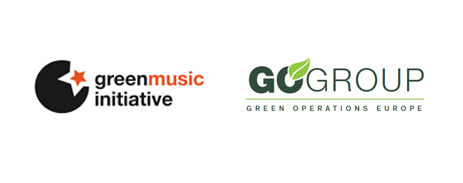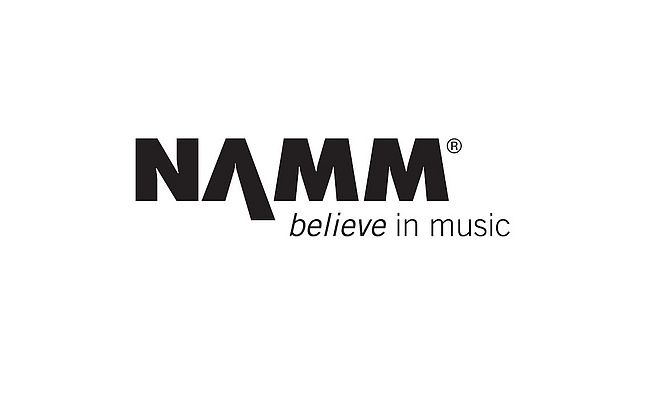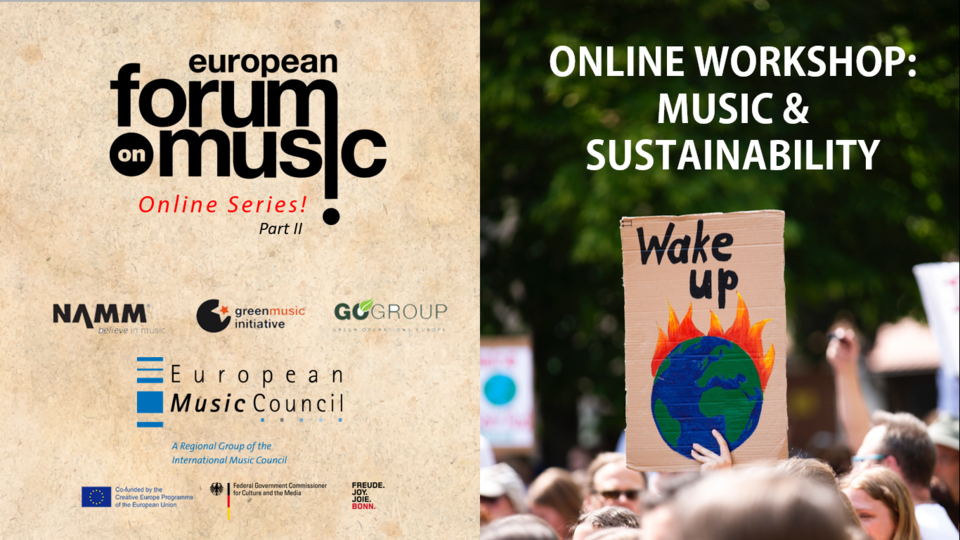Online Workshop: Music and Sustainability
The second part of our EFM Online Series was a workshop organised in cooperation with GO Group and the Green Music Initiative. On 18 June 2020 from 14:00-17:00, we invited our members and all interested music stakeholders to discover and discuss on initiatives and ways of transforming the music sector towards a more environmentally sustainable one.
The EFM Online Series Workshop is supported by EMC funders and by NAMM.
Workshop Topics
(copy 1)
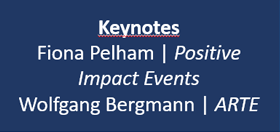
Fiona Pelham highlighted why Music as a driver for change – from United Nations Sustainable Development Goals to creative climate action then Wolfgang Bergmann gave us insights on The digital learning curve in pandemic times.
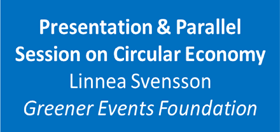
It is the most obvious approach. If we want to decrease the emissions and still want the same result, quality and comfort, the solution must be the treatment of the resources used. What do we use and where does it come from? Where does it go afterwards and what happens with it? Circular economy aims at eliminating waste and the continual use of resources. It applies to i.e. an event's or concert's procurement, food supply and resource management. We will help you to rethink a current system.
♦ Find Linnéa's presentation on the video at 00:30:11.
(copy 2)
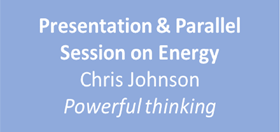
Do we really need more? Today we have an almost inexhaustible supply of energy and at the same time there is knowledge available how to be efficient and responsible with such a resource of big impact. While there are commitments for climate targets to be met, does the demand of audiences, artists productions and our own daily business support those? Let's find the most efficient solutions with the most suitable sources and the least emissions produced to meet those needs and power the music industry of the future. In this session we will talk about needs, plans and developments to change the industry‘s energy philosophy.
♦ Find Chris' presentation on the video at 00:54:50.
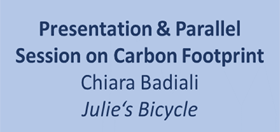
Do you know the environmental impact of your work? Can you name all the sources that add to your personal footprint or the footprint of your organisation? Knowledge is the key to improvement and in the process of setting aims it is necessary to know where you're starting from. There are ways to accurately measure impacts from activities such as venues and cultural buildings, outdoor events, offices, tours and productions. We will touch on how energy, water, waste, travel (i.e. audience, business, production, freight, fleet) contribute and what the challenges are.
♦ Find Chiara's presentation on the video at 00:42:23.
(copy 3)
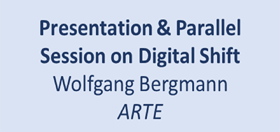
With the implications due to the Corona crisis, many cultural actors are urged to move their formats into the digital world. We all know that no digital format can be a real substitute for the real experience. But in the wake of the Corona crisis, there are already some real success stories. Arte’s cooperation with the United We Stream initiative started by Berlin Club Commission, now has 48 more cities that have joined the idea. Since the project began in March it has received around 11 million views on the Arte channels. After already broadcasting from clubs in Germany, Austria and England, United We Stream is now being expanded to France and is becoming more and more a major European project. At the summertime ARTE launched a formate for classical music performed and presented by classical artist Daniel Hope from his living room in the middle of Berlin. He created a“rendez-vous“ for people al over the world listening to Hope@Home. What was the magic ingredient, that this daily stream reached so many people? What challenges did this project face, what are the visions beyond this summer of the pandemic for digital streams in a pan European context?
♦ Find Wolfgang's presentation on the video at 01:08:37.
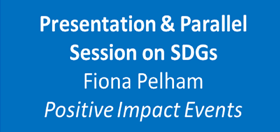
The UN Sustainable Development Goals (SDGs) adopted by all UN member states in 2015, have been created as a shared blueprint for peace and prosperity for people and the planet. At its heart are the 17 Goals, which recognize that ending poverty and other deprivations must go hand-in-hand with strategies that reduce inequality, spur economic growth, improve health – all while tackling climate change and working to preserve nature. We will talk how music, arts and events can orientate themselves along this system and use it to our and the advantage of all people.
♦ Find Fiona's presentation on the video at 00:14:30.
Are you one of 100,000 #eventprofs in action building the future of how human connection happens?
Join over 1000 ambassadors in action today: https://bit.ly/PIEjoin
Get some ideas on how to Innovate with the SDGs and Build the Future of How Human Connection Happens here
Speakers at the Online Workshop
Chiara Badiali
Julie’s Bicycle | UK

Founded in 2007 from within the UK music industry to respond to the climate crisis, Julie’s Bicycle is a charity working globally to catalyse and support climate and environmental action in the creative community, with a focus on reducing greenhouse gas emissions and catalysing a new creative ecology. Chiara joined JB in 2012 and since then has contributed to publications like the ‘The Show Must Go On’ report on UK music festival environmental impacts, worked on projects including the Europe-wide EE MUSIC: energy efficiency in live music and Arts Council England Environmental Programme, and helped design the international Julie's Bicycle Creative Climate Leadership professional development programme. She is part of the Music Declares Emergency working group, supporting the campaign with environmental expertise and advice.
Julie's Bicycle
Wolfgang Bergmann
Arte | GER
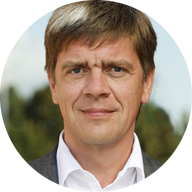
Wolfgang Bergmann is the managing director of ARTE Deutschland GmbH and ARTE Coordinator of the ZDF, Head of the Theatre and Music unit and former Head of ZDFtheaterkanal (the ZDF’s theatre channel) alongside carrying out missions for 3sat and ARTE.
ARTE
Jacob Bilabel
Green Music Initiative | GER

Jacob Sylvester Bilabel is the founder of the Europe-wide Think-Do-Tank Green Music Initiative (GMI) and co-founder of GO Group (Green Operations Europe). GMI and GO Group are committed to creating a smarter, greener and more social future for the music and entertainment industry.
From 2013 to 2015, Bilabel was a project leader of the Energy Efficient Music Culture (EE MUSIC) project co-funded by the European Commission‘s Intelligent Energy Europe program which has been responsible for a series of more than 60 workshops in 27 European countries. In 2016, Jacob Bilabel was appointed a member of the Committee of Experts on Creative Industries of the German Federal Ministry for Economic Affairs and Energy. In 2018, he was appointed to the research consortium of the European Everywh2ere project, which develops emission-free hydrogen generators for festivals, events and refugee camps under the Horizon 2020 program. In 2016 he took the next step in his journey and launched the Good Life Academy in Germany and Switzerland.
Green Music Initiative
Betty Heywood
NAMM | UK - USA
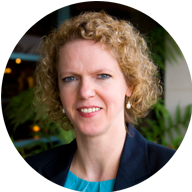
After completing her MA in Chinese History and Literature at the University of Hamburg, Betty Heywood has worked in the events industry for over 30 years, including spells at Andre Heller’s Chinese National Circus in Germany, trade show organiser’s Messe Frankfurt offices in Hong Kong and Shanghai, as well as for the last 15 years in the USA and the UK at NAMM, the not for profit association for the International Music Products Industry. With around 10 000 members in over 100 countries and territories, NAMM represents the interests of the global music products and event technology industries, and advocates, in conjunction with global partners, for access to active participation in music making across the lifespan. As Director of International Affairs, Betty is responsible for taking care of NAMM’s international membership and working with partners across the globe to achieve NAMM’s mission, vision and objectives.
NAMM
Chris Johnson
Vision 2025 | UK
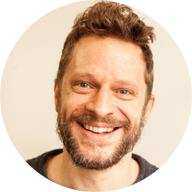
Chris is co-founder and chair of Powerful Thinking – the UK’s think-do tank on sustainable energy, and co-founder and CEO of the Energy Revolution charity. He is Co-Founder, Operations Director and Sustainability lead of Shambala Festival, spending 17 years pioneering green initiatives that tackle food sourcing, plastics, energy, travel and wider environmental impacts. Chris is a regular speaker, conference program collaborator, occasional lecturer and campaigner, has combined an extensive event management history, including managing events up to 80,000 capcity, with a passionate commitment and unparalleled experience of delivering sustainable initiatives at events. Chris has worked with individual clients, event agencies, as part of European projects, with local authorities and at industry scale.
Vision 2025
Fiona Pelham
Positive Impact Events | UK
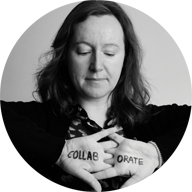
Fiona launched not for profit Positive Impact Events in 2005 to provide education, engagement and collaboration opportunities to create a sustainable event industry. She was the youngest female to chair an ISO standard when, in 2012, ISO 20121, a management system for event sustainability, was created.
In 2014 Fiona received an honorary doctorate from Leeds Beckett University for services to the event industry and sustainability and in 2018 chaired Meeting Professionals Inter-national, a global association of over 17,000 members. In 2018 She joined the UN Environment technical expert group for transforming tourism value chains.
In 2019 she provided a plan to the United Nations Sustainable Development Goal Summit on the role of events in accelerating action on the SDGs and in 2020, during COVID 19, she launched a campaign to empower 100,000 event professionals to be in action building the future of how human connection happens.
Fiona is an award-winning entrepreneur passionate about sustainability.
Positive Impact Events
Holger Jan Schmidt
GO Group | GER
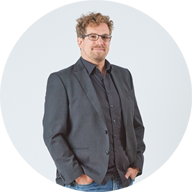
Holger Jan Schmidt is one of Europe’s main networkers on festivals and sustainability. He is co-initiator and steering committee member of the pan-European think-tank GO Group (Green Operations Europe) and the anchorman for green issues of Yourope (the European Festival Association). Holger is project manager of the international Take A Stand initiative and campaign for the (live) music sector, which was launched in 2017 to create a movement encouraging social cohesion in our society as well as promoting awareness and tolerance. He looks back at more than twenty-five years with two of Germany’s biggest festivals, RhEINKULTUR and DAS FEST. Holger wrote the „Sounds For Nature guidelines for environmentally friendly events“, is a lecturer for „Sustainable Festival & Event Management“ and a performing and recording musician as well.
GO Group
Ian Smith
European Music Council
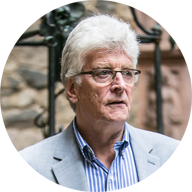
Ian Smith studied at the Royal Academy of Music in London before being appointed as Co-Principal horn with the Scottish National Orchestra in 1971. He also worked with the LPO, BBCSO, Philharmonia and for 8 years with the London Symphony Orchestra. Ian was also the Founder/Director of Scottish Brass. Ian joined the UK Musician's Union in 1993 as Scottish Organiser, then taking responsibility for Northern Ireland. He created a new department for Folk and Traditional Music whilst at the MU, also becoming a Governor of the RSAMD (now Royal Conservatoire of Scotland) and a member of the Executive Board of the Musicians' Benevolent Fund. In 2005 Ian was appointed as Head of Music at the Scottish Arts Council, then moving to the new Government body; Creative Scotland as Head of Music and Intellectual Property in 2010. He retired from that post in 2016. Ian is currently the President of the European Music Council (based in Bonn) and until January 2020, the Treasurer and Executive Board member of the International Society for the Performing Arts (based in New York). Ian is currently a member of the boards of Cryptic, a Music and Sonic Arts production company and the Red Note Ensemble, one of Europe's leading contemporary music ensembles, both based in Scotland where Ian is based.
Linnéa Elisabeth Svensson
Greener Events Foundation | NO

Linnéa Elisabeth Svensson has more than 20 years of experience with production, sponsorship and sustainability for events and festivals. She curates the programme of conferences in the areas Music business and Urban development eg. by:Larm and Oslo Urban Arena. Svensson mentors organizers of sporting, culture and urban placemaking events in production and implementing sustainability measures, as well as sustainable corporate partnerships. She lectures a term course in the topic 'Event management' at the Norwegian Business School. Linnéa Svensson is one of the co-founders of GO Group (Green Operations Europe) and YOUROPE's EMAC Group (European Marketing and Communications Group). She is a certified Eco Lighthouse consultant, facilitates the ISO 20121 management system, and is an assessor for A Greener Festival.
Greener Events Foundation
In cooperation with
